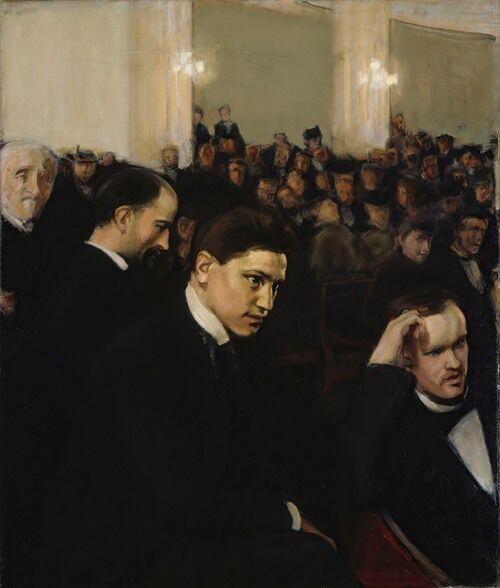How demonstrative was it, if an emperor such as Theodosius II prohibits a certain people from getting into lucrative public office, and under his reign there was "...significant instances of anti-Jewish violence, often led by Christian bishops in cities such as Alexandria and Edessa."
The Byzantines, whilst they didn't build a Nazi style bureaucracy to go against the Jews, instead they just banned them -for the most part, from joining the imperial bureaucracy.
Modern day calls for decentralized governance in the Middle East seem to romanticise the ancient pastoral communities. And it always made to look like it's the solution for the problems in the Middle East. That is a mistake, as whenever there is talk about doing it in a practical sense , it means federalism. Federalism- especially in its modern form comes out of the Anglo Protestant dissenting movement, always ends up producing a "..severe allergic response" to people in the Middle East " because it is always seen a gateway to separatism and challenges to territorial integrity.
https://papers.ssrn.com/sol3/papers.cfm?abstract_id=3947268
Please see a recent example in Syria of how calls for federalism are perceived by the locals:
https://archive.md/BX38b
In any case decentralization means many things to different people, but the idea of federalism just ends up getting rejected in favour of integration, as in the case of the Iraqi Kurds.
The Ottoman millet system was a means of integrating different confessional groups under their rule, not as a way to devolve power to minority groups.
For example "... non-Muslims were under the jurisdiction of Islamic courts..." and the "claim that non-muslim communities had their courts is...a case of misrepresentation."
Under the Ottomans, there was to be no other law outside of Islamic Law, that was allowed to be administered because it would "...conflict with the authorities of the Islamic courts." The autonomy of minority groups was restricted, and to the extent there was 'freedom' in was minor areas-religious affairs, education and family law', that the central Ottoman state didn't think it was profitable to interfere in.
In essence the real intention of the millet system was '...to secure the loyalty of the conquered non-Muslim peoples by binding their religious leaders to the Ottoman state.'
https://www.academia.edu/download/63512937/Is_Millet_System_a_Reality_or_a_Myth_M._Macit_Kenanoglu20200603-111629-4gn6pg.pdf
https://archive.org/details/islamicsocietywe0001gibb_r0l3
https://cronfa.swan.ac.uk/Record/cronfa56660/Description#tabnav

augustuscato / Augustus Cato
npub1p2…hpqlq
2025-05-31 19:59:30
in reply to nevent1q…6ntm
Author Public Key
npub1p22hyejtr60rdrmjvql5k8fyv8lkq8exzw5mkkx3qcwqcu6979aqvhpqlqPublished at
2025-05-31 19:59:30Event JSON
{
"id": "1dc9e7b341284af64b56867a64c1632576dac7aa87b9fb9b1e23efd970fc9cab",
"pubkey": "0a9572664b1e9e368f72603f4b1d2461ff601f2613a9bb58d1061c0c7345f17a",
"created_at": 1748721570,
"kind": 1,
"tags": [
[
"e",
"fdc56fa2f42be4b1ecbc242eb10ecd6b93b5632e9134041aba79942bff7217f8",
"",
"root"
],
[
"e",
"3f43ecc8eabe9ad7939983155529655f4363f18ae36c49664b76bacb8dabd516"
],
[
"e",
"83689ea3e3daf6b51e3fc8c8129dad5a1ea4475744f3a000dbba8219485c8751",
"",
"reply"
],
[
"p",
"0a9572664b1e9e368f72603f4b1d2461ff601f2613a9bb58d1061c0c7345f17a"
],
[
"p",
"a96a35a224402b8075c4da20f0477896afcc3395b6fad63e30a648a8222a6a69"
],
[
"r",
"https://papers.ssrn.com/sol3/papers.cfm?abstract_id=3947268"
],
[
"r",
"https://archive.md/BX38b"
],
[
"r",
"https://www.academia.edu/download/63512937/Is_Millet_System_a_Reality_or_a_Myth_M._Macit_Kenanoglu20200603-111629-4gn6pg.pdf"
],
[
"r",
"https://archive.org/details/islamicsocietywe0001gibb_r0l3"
],
[
"r",
"https://cronfa.swan.ac.uk/Record/cronfa56660/Description#tabnav"
]
],
"content": "How demonstrative was it, if an emperor such as Theodosius II prohibits a certain people from getting into lucrative public office, and under his reign there was \"...significant instances of anti-Jewish violence, often led by Christian bishops in cities such as Alexandria and Edessa.\"\n\nThe Byzantines, whilst they didn't build a Nazi style bureaucracy to go against the Jews, instead they just banned them -for the most part, from joining the imperial bureaucracy.\n\nModern day calls for decentralized governance in the Middle East seem to romanticise the ancient pastoral communities. And it always made to look like it's the solution for the problems in the Middle East. That is a mistake, as whenever there is talk about doing it in a practical sense , it means federalism. Federalism- especially in its modern form comes out of the Anglo Protestant dissenting movement, always ends up producing a \"..severe allergic response\" to people in the Middle East \" because it is always seen a gateway to separatism and challenges to territorial integrity.\n\nhttps://papers.ssrn.com/sol3/papers.cfm?abstract_id=3947268\n\nPlease see a recent example in Syria of how calls for federalism are perceived by the locals:\n\nhttps://archive.md/BX38b\n\nIn any case decentralization means many things to different people, but the idea of federalism just ends up getting rejected in favour of integration, as in the case of the Iraqi Kurds.\n\nThe Ottoman millet system was a means of integrating different confessional groups under their rule, not as a way to devolve power to minority groups.\nFor example \"... non-Muslims were under the jurisdiction of Islamic courts...\" and the \"claim that non-muslim communities had their courts is...a case of misrepresentation.\"\n \nUnder the Ottomans, there was to be no other law outside of Islamic Law, that was allowed to be administered because it would \"...conflict with the authorities of the Islamic courts.\" The autonomy of minority groups was restricted, and to the extent there was 'freedom' in was minor areas-religious affairs, education and family law', that the central Ottoman state didn't think it was profitable to interfere in. \n\nIn essence the real intention of the millet system was '...to secure the loyalty of the conquered non-Muslim peoples by binding their religious leaders to the Ottoman state.'\n https://www.academia.edu/download/63512937/Is_Millet_System_a_Reality_or_a_Myth_M._Macit_Kenanoglu20200603-111629-4gn6pg.pdf\n\n\nhttps://archive.org/details/islamicsocietywe0001gibb_r0l3\n\n\nhttps://cronfa.swan.ac.uk/Record/cronfa56660/Description#tabnav",
"sig": "0ca716eb4cdce27773fa280a384ddcf4e888ee5a696f50538f2e57a5ec50f32997f11c0f47554996837382303c0d97fa80fa891b80c5af0dc4f4c2e3b211d8b6"
}